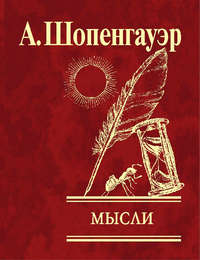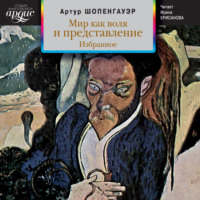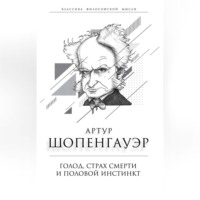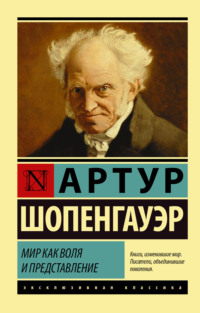 полная версия
полная версияThe World as Will and Idea (Vol. 3 of 3)
“Rien n'est beau que le vrai; le vrai seul est aimable.”
– Boil.Certainly, however, it is also confirmed by experience, although not by the experience of every day, that that which as a rule only appears as a strong yet still controllable inclination may rise under certain circumstances to a passion which exceeds all others in vehemence, and which then sets aside all considerations, overcomes all obstacles with incredible strength and perseverance, so that for its satisfaction life is risked without hesitation, nay, if that satisfaction is still withheld, is given as the price of it. Werthers and Jacopo Ortis exist not only in romance, but every year can show at least half a dozen of them in Europe: Sed ignotis perierunt mortibus illi; for their sorrows find no other chroniclers than the writers of official registers or the reporters of the newspapers. Yet the readers of the police news in English and French journals will attest the correctness of my assertion. Still greater, however, is the number of those whom the same passion brings to the madhouse. Finally, every year can show cases of the double suicide of a pair of lovers who are opposed by outward circumstances. In such cases, however, it is inexplicable to me how those who, certain of mutual love, expect to find the supremest bliss in the enjoyment of this, do not withdraw themselves from all connections by taking the extremest steps, and endure all hardships, rather than give up with life a pleasure which is greater than any other they can conceive. As regards the lower grades of that passion, and the mere approaches to it, every one has them daily before his eyes, and, as long as he is not old, for the most part also in his heart.
So then, after what has here been called to mind, no one can doubt either the reality or the importance of the matter; and therefore, instead of wondering that a philosophy should also for once make its own this constant theme of all poets, one ought rather to be surprised that a thing which plays throughout so important a part in human life has hitherto practically been disregarded by philosophers altogether, and lies before us as raw material. The one who has most concerned himself with it is Plato, especially in the “Symposium” and the “Phædrus.” Yet what he says on the subject is confined to the sphere of myths, fables, and jokes, and also for the most part concerns only the Greek love of youths. The little that Rousseau says upon our theme in the “Discours sur l'inégalité” (p. 96, ed. Bip.) is false and insufficient. Kant's explanation of the subject in the third part of the essay, “Ueber das Gefühl des Schönen und Erhabenen” (p. 435 seq. of Rosenkranz's edition), is very superficial and without practical knowledge, therefore it is also partly incorrect. Lastly, Platner's treatment of the matter in his “Anthropology” (§ 1347 seq.) every one will find dull and shallow. On the other hand, Spinoza's definition, on account of its excessive naïveté, deserves to be quoted for the sake of amusement: “Amor est titillatio, concomitante idea causæ externæ” (Eth. iv., prop. 44, dem.) Accordingly I have no predecessors either to make use of or to refute. The subject has pressed itself upon me objectively, and has entered of its own accord into the connection of my consideration of the world. Moreover, least of all can I hope for approbation from those who are themselves under the power of this passion, and who accordingly seek to express the excess of their feelings in the sublimest and most ethereal images. To them my view will appear too physical, too material, however metaphysical and even transcendent it may be at bottom. Meanwhile let them reflect that if the object which to-day inspires them to write madrigals and sonnets had been born eighteen years earlier it would scarcely have won a glance from them.
For all love, however ethereally it may bear itself, is rooted in the sexual impulse alone, nay, it absolutely is only a more definitely determined, specialised, and indeed in the strictest sense individualised sexual impulse. If now, keeping this in view, one considers the important part which the sexual impulse in all its degrees and nuances plays not only on the stage and in novels, but also in the real world, where, next to the love of life, it shows itself the strongest and most powerful of motives, constantly lays claim to half the powers and thoughts of the younger portion of mankind, is the ultimate goal of almost all human effort, exerts an adverse influence on the most important events, interrupts the most serious occupations every hour, sometimes embarrasses for a while even the greatest minds, does not hesitate to intrude with its trash interfering with the negotiations of statesmen and the investigations of men of learning, knows how to slip its love letters and locks of hair even into ministerial portfolios and philosophical manuscripts, and no less devises daily the most entangled and the worst actions, destroys the most valuable relationships, breaks the firmest bonds, demands the sacrifice sometimes of life or health, sometimes of wealth, rank, and happiness, nay, robs those who are otherwise honest of all conscience, makes those who have hitherto been faithful, traitors; accordingly, on the whole, appears as a malevolent demon that strives to pervert, confuse, and overthrow everything; – then one will be forced to cry, Wherefore all this noise? Wherefore the straining and storming, the anxiety and want? It is merely a question of every Hans finding his Grethe.37 Why should such a trifle play so important a part, and constantly introduce disturbance and confusion into the well-regulated life of man? But to the earnest investigator the spirit of truth gradually reveals the answer. It is no trifle that is in question here; on the contrary, the importance of the matter is quite proportionate to the seriousness and ardour of the effort. The ultimate end of all love affairs, whether they are played in sock or cothurnus, is really more important than all other ends of human life, and is therefore quite worthy of the profound seriousness with which every one pursues it. That which is decided by it is nothing less than the composition of the next generation. The dramatis personæ who shall appear when we are withdrawn are here determined, both as regards their existence and their nature, by these frivolous love affairs. As the being, the existentia, of these future persons is absolutely conditioned by our sexual impulse generally, so their nature, essentia, is determined by the individual selection in its satisfaction, i. e., by sexual love, and is in every respect irrevocably fixed by this. This is the key of the problem: we shall arrive at a more accurate knowledge of it in its application if we go through the degrees of love, from the passing inclination to the vehement passion, when we shall also recognise that the difference of these grades arises from the degree of the individualisation of the choice.
The collective love affairs of the present generation taken together are accordingly, of the whole human race, the serious meditatio compositionis generationis futuræ, e qua iterum pendent innumeræ generationes. This high importance of the matter, in which it is not a question of individual weal or woe, as in all other matters, but of the existence and special nature of the human race in future times, and therefore the will of the individual appears at a higher power as the will of the species; – this it is on which the pathetic and sublime elements in affairs of love depend, which for thousands of years poets have never wearied of representing in innumerable examples; because no theme can equal in interest this one, which stands to all others which only concern the welfare of individuals as the solid body to the surface, because it concerns the weal and woe of the species. Just on this account, then, is it so difficult to impart interest to a drama without the element of love, and, on the other hand, this theme is never worn out even by daily use.
That which presents itself in the individual consciousness as sexual impulse in general, without being directed towards a definite individual of the other sex, is in itself, and apart from the phenomenon, simply the will to live. But what appears in consciousness as a sexual impulse directed to a definite individual is in itself the will to live as a definitely determined individual. Now in this case the sexual impulse, although in itself a subjective need, knows how to assume very skilfully the mask of an objective admiration, and thus to deceive our consciousness; for nature requires this stratagem to attain its ends. But yet that in every case of falling in love, however objective and sublime this admiration may appear, what alone is looked to is the production of an individual of a definite nature is primarily confirmed by the fact that the essential matter is not the reciprocation of love, but possession, i. e., the physical enjoyment. The certainty of the former can therefore by no means console us for the want of the latter; on the contrary, in such a situation many a man has shot himself. On the other hand, persons who are deeply in love, and can obtain no return of it, are contented with possession, i. e., with the physical enjoyment. This is proved by all forced marriages, and also by the frequent purchase of the favour of a woman, in spite of her dislike, by large presents or other sacrifices, nay, even by cases of rape. That this particular child shall be begotten is, although unknown to the parties concerned, the true end of the whole love story; the manner in which it is attained is a secondary consideration. Now, however loudly persons of lofty and sentimental soul, and especially those who are in love, may cry out here about the gross realism of my view, they are yet in error. For is not the definite determination of the individualities of the next generation a much higher and more worthy end than those exuberant feelings and super-sensible soap bubbles of theirs? Nay, among earthly aims, can there be one which is greater or more important? It alone corresponds to the profoundness with which passionate love is felt, to the seriousness with which it appears, and the importance which it attributes even to the trifling details of its sphere and occasion. Only so far as this end is assumed as the true one do the difficulties encountered, the infinite exertions and annoyances made and endured for the attainment of the loved object, appear proportionate to the matter. For it is the future generation, in its whole individual determinateness, that presses into existence by means of those efforts and toils. Nay, it is itself already active in that careful, definite, and arbitrary choice for the satisfaction of the sexual impulse which we call love. The growing inclination of two lovers is really already the will to live of the new individual which they can and desire to produce; nay, even in the meeting of their longing glances its new life breaks out, and announces itself as a future individuality harmoniously and well composed. They feel the longing for an actual union and fusing together into a single being, in order to live on only as this; and this longing receives its fulfilment in the child which is produced by them, as that in which the qualities transmitted by them both, fused and united in one being, live on. Conversely, the mutual, decided and persistent aversion between a man and a maid is a sign that what they could produce would only be a badly organised, in itself inharmonious and unhappy being. Hence there lies a deeper meaning in the fact that Calderon, though he calls the atrocious Semiramis the daughter of the air, yet introduces her as the daughter of rape followed by the murder of the husband.
But, finally, what draws two individuals of different sex exclusively to each other with such power is the will to live, which exhibits itself in the whole species, and which here anticipates in the individual which these two can produce an objectification of its nature answering to its aims. This individual will have the will, or character, from the father, the intellect from the mother, and the corporisation from both; yet, for the most part, the figure will take more after the father, the size after the mother, – according to the law which comes out in the breeding of hybrids among the brutes, and principally depends upon the fact that the size of the fœtus must conform to the size of the uterus. Just as inexplicable as the quite special individuality of any man, which is exclusively peculiar to him, is also the quite special and individual passion of two lovers; indeed at bottom the two are one and the same: the former is explicite what the latter was implicite. The moment at which the parents begin to love each other – to fancy each other, as the very happy English expression has it – is really to be regarded as the first appearance of a new individual and the true punctum saliens of its life, and, as has been said, in the meeting and fixing of their longing glances there appears the first germ of the new being, which certainly, like all germs, is generally crushed out. This new individual is to a certain extent a new (Platonic) Idea; and now, as all Ideas strive with the greatest vehemence to enter the phenomenal world, eagerly seizing for this end upon the matter which the law of causality divides among them all, so also does this particular Idea of a human individuality strive with the greatest eagerness and vehemence towards its realisation in the phenomenon. This eagerness and vehemence is just the passion of the two future parents for each other. It has innumerable degrees, the two extremes of which may at any rate be described as Αφροδιτη πανδημος and ουρανια; in its nature, however, it is everywhere the same. On the other hand, it will be in degree so much the more powerful the more individualised it is; that is, the more the loved individual is exclusively suited, by virtue of all his or her parts and qualities, to satisfy the desire of the lover and the need established by his or her own individuality. What is really in question here will become clear in the further course of our exposition. Primarily and essentially the inclination of love is directed to health, strength, and beauty, consequently also to youth; because the will first of all seeks to exhibit the specific character of the human species as the basis of all individuality: ordinary amorousness (Αφροδιτη πανδημος) does not go much further. To these, then, more special claims link themselves on, which we shall investigate in detail further on, and with which, when they see satisfaction before them, the passion increases. But the highest degrees of this passion spring from that suitableness of two individualities to each other on account of which the will, i. e., the character, of the father and the intellect of the mother, in their connection, make up precisely that individual towards which the will to live in general which exhibits itself in the whole species feels a longing proportionate to this its magnitude, and which therefore exceeds the measure of a mortal heart, and the motives of which, in the same way, lie beyond the sphere of the individual intellect. This is thus the soul of a true and great passion. Now the more perfect is the mutual adaptation of two individuals to each other in each of the many respects which have further to be considered, the stronger will be their mutual passion. Since there do not exist two individuals exactly alike, there must be for each particular man a particular woman – always with reference to what is to be produced – who corresponds most perfectly. A really passionate love is as rare as the accident of these two meeting. Since, however, the possibility of such a love is present in every one, the representations of it in the works of the poets are comprehensible to us. Just because the passion of love really turns about that which is to be produced, and its qualities, and because its kernel lies here, a friendship without any admixture of sexual love can exist between two young and good-looking persons of different sex, on account of the agreement of their disposition, character, and mental tendencies; nay, as regards sexual love there may even be a certain aversion between them. The reason of this is to be sought in the fact that a child produced by them would have physical or mental qualities which were inharmonious; in short, its existence and nature would not answer the ends of the will to live as it exhibits itself in the species. On the other hand, in the case of difference of disposition, character, and mental tendency, and the dislike, nay, enmity, proceeding from this, sexual love may yet arise and exist; when it then blinds us to all that; and if it here leads to marriage it will be a very unhappy one.
Let us now set about the more thorough investigation of the matter. Egoism is so deeply rooted a quality of all individuals in general, that in order to rouse the activity of an individual being egoistical ends are the only ones upon which we can count with certainty. Certainly the species has an earlier, closer, and greater claim upon the individual than the perishable individuality itself. Yet when the individual has to act, and even make sacrifices for the continuance and quality of the species, the importance of the matter cannot be made so comprehensible to his intellect, which is calculated merely with regard to individual ends, as to have its proportionate effect. Therefore in such a case nature can only attain its ends by implanting a certain illusion in the individual, on account of which that which is only a good for the species appears to him as a good for himself, so that when he serves the species he imagines he is serving himself; in which process a mere chimera, which vanishes immediately afterwards, floats before him, and takes the place of a real thing as a motive. This illusion is instinct. In the great majority of cases this is to be regarded as the sense of the species, which presents what is of benefit to it to the will. Since, however, the will has here become individual, it must be so deluded that it apprehends through the sense of the individual what the sense of the species presents to it, thus imagines it is following individual ends while in truth it is pursuing ends which are merely general (taking this word in its strictest sense). The external phenomenon of instinct we can best observe in the brutes where its rôle is most important; but it is in ourselves alone that we arrive at a knowledge of its internal process, as of everything internal. Now it is certainly supposed that man has almost no instinct; at any rate only this, that the new-born babe seeks for and seizes the breast of its mother. But, in fact, we have a very definite, distinct, and complicated instinct, that of the selection of another individual for the satisfaction of the sexual impulse, a selection which is so fine, so serious, and so arbitrary. With this satisfaction in itself, i. e., so far as it is a sensual pleasure resting upon a pressing want of the individual, the beauty or ugliness of the other individual has nothing to do. Thus the regard for this which is yet pursued with such ardour, together with the careful selection which springs from it, is evidently connected, not with the chooser himself – although he imagines it is so – but with the true end, that which is to be produced, which is to receive the type of the species as purely and correctly as possible. Through a thousand physical accidents and moral aberrations there arise a great variety of deteriorations of the human form; yet its true type, in all its parts, is always again established: and this takes place under the guidance of the sense of beauty, which always directs the sexual impulse, and without which this sinks to the level of a disgusting necessity. Accordingly, in the first place, every one will decidedly prefer and eagerly desire the most beautiful individuals, i. e., those in whom the character of the species is most purely impressed; but, secondly, each one will specially regard as beautiful in another individual those perfections which he himself lacks, nay, even those imperfections which are the opposite of his own. Hence, for example, little men love big women, fair persons like dark, &c. &c. The delusive ecstasy which seizes a man at the sight of a woman whose beauty is suited to him, and pictures to him a union with her as the highest good, is just the sense of the species, which, recognising the distinctly expressed stamp of the same, desires to perpetuate it with this individual. Upon this decided inclination to beauty depends the maintenance of the type of the species: hence it acts with such great power. We shall examine specially further on the considerations which it follows. Thus what guides man here is really an instinct which is directed to doing the best for the species, while the man himself imagines that he only seeks the heightening of his own pleasure. In fact, we have in this an instructive lesson concerning the inner nature of all instinct, which, as here, almost always sets the individual in motion for the good of the species. For clearly the pains with which an insect seeks out a particular flower, or fruit, or dung, or flesh, or, as in the case of the ichneumonidæ, the larva of another insect, in order to deposit its eggs there only, and to attain this end shrinks neither from trouble nor danger, is thoroughly analogous to the pains with which for his sexual satisfaction a man carefully chooses a woman with definite qualities which appeal to him individually, and strives so eagerly after her that in order to attain this end he often sacrifices his own happiness in life, contrary to all reason, by a foolish marriage, by love affairs which cost him wealth, honour, and life, even by crimes such as adultery or rape, all merely in order to serve the species in the most efficient way, although at the cost of the individual, in accordance with the will of nature which is everywhere sovereign. Instinct, in fact, is always an act which seems to be in accordance with the conception of an end, and yet is entirely without such a conception. Nature implants it wherever the acting individual is incapable of understanding the end, or would be unwilling to pursue it. Therefore, as a rule, it is given only to the brutes, and indeed especially to the lowest of them which have least understanding; but almost only in the case we are here considering it is also given to man, who certainly could understand the end, but would not pursue it with the necessary ardour, that is, even at the expense of his individual welfare. Thus here, as in the case of all instinct, the truth assumes the form of an illusion, in order to act upon the will. It is a voluptuous illusion which leads the man to believe he will find a greater pleasure in the arms of a woman whose beauty appeals to him than in those of any other; or which indeed, exclusively directed to a single individual, firmly convinces him that the possession of her will ensure him excessive happiness. Therefore he imagines he is taking trouble and making sacrifices for his own pleasure, while he does so merely for the maintenance of the regular type of the species, or else a quite special individuality, which can only come from these parents, is to attain to existence. The character of instinct is here so perfectly present, thus an action which seems to be in accordance with the conception of an end, and yet is entirely without such a conception, that he who is drawn by that illusion often abhors the end which alone guides it, procreation, and would like to hinder it; thus it is in the case of almost all illicit love affairs. In accordance with the character of the matter which has been explained, every lover will experience a marvellous disillusion after the pleasure he has at last attained, and will wonder that what was so longingly desired accomplishes nothing more than every other sexual satisfaction; so that he does not see himself much benefited by it. That wish was related to all his other wishes as the species is related to the individual, thus as the infinite to the finite. The satisfaction, on the other hand, is really only for the benefit of the species, and thus does not come within the consciousness of the individual, who, inspired by the will of the species, here served an end with every kind of sacrifice, which was not his own end at all. Hence, then, every lover, after the ultimate consummation of the great work, finds himself cheated; for the illusion has vanished by means of which the individual was here the dupe of the species, Accordingly Plato very happily says: “ἡδονη ἁπαντων αλαζονεστατον” (voluptas ommlum maxime vaniloqua), Phileb. 319.









